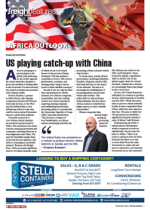Not much has happened trade-wise since the January 2021 launch of trading under the African Continental Free Trade Area (AfCFTA), according to Teniola T Tayo of the Africa Policy Research Institute.“Major challenges include clashes between national and continental aspirations that are already evident in the slow negotiations and that will need to be mitigated when the agreement is implemented,” Tayo said. One of the biggest sticking points is in the Rules of Origin (RoO) for both goods and services.According to the United Nations Economic Commission for Africa, the RoO negotiations could “make or break” AfCFTA.“Innovative ideas are paramount to finding common ground among the various interests represented in the free trade area and sustainable solutions to identified challenges. “Getting the AfCFTA off the ground and ensuring the success of its eventual implementation will require lessons to be learned from Africa’s regional economic communities, which also serve as building blocks for the AfCFTA,” wrote Tayo in a blog. As of October 2023, 54 countries had signed the AfCFTA agreement and 47 had deposited their instruments of ratification. This majority more than meets the minimum requirements for bringing the AfCFTA into force.However, before trade can fully commence, tariff offers must be submitted by member countries.The AfCFTA intends 90% and 97% of tariff lines to be eventually liberalised in the first and second phases, respectively, but does not stipulate which tariff lines countries are mandated to liberalise. The AfCFTA Secretariat has received 29 tariff offers for trade in goods that could be considered complete but is still waiting on several others. The tariff offers are largely dependent on the RoO negotiations, which are experiencing some delays, according to Tayo.“Negotiations under the different protocols are at various stages of completion, albeit behind schedule.” In addition, “there are still significant gaps in trade facilitation measures such as transport infrastructure and logistics. “Mobilising political and economic resources for trade facilitation on the continental, national and regional levels may also prove challenging.“The global environment and geopolitics, such as external efforts towards establishing bilateral trade agreements with state parties, continue to intersect with the AfCFTA. “The volatile investment environment is also a challenge, given the immense capital needed to scale production in response to the AfCFTA,” he writes.

